The Handheld DNA Reader Market is estimated to be valued at USD 268.3 million in 2025 and is projected to reach USD 1085.5 million by 2035, registering a compound annual growth rate (CAGR) of 15.0% over the forecast period.
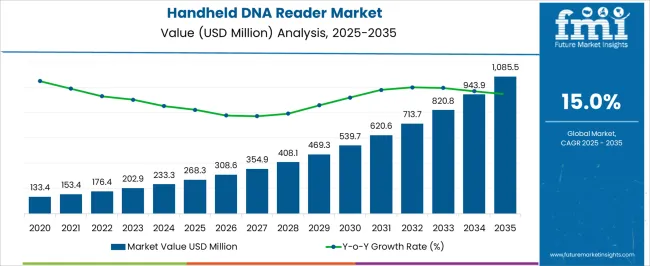
| Metric | Value |
|---|---|
| Handheld DNA Reader Market Estimated Value in (2025 E) | USD 268.3 million |
| Handheld DNA Reader Market Forecast Value in (2035 F) | USD 1085.5 million |
| Forecast CAGR (2025 to 2035) | 15.0% |
The Handheld DNA Reader market is witnessing robust growth due to the rising demand for rapid, portable, and user-friendly genetic testing solutions. These devices are becoming increasingly important in clinical diagnostics, forensic analysis, agriculture, and personalized medicine, as they provide quick and reliable DNA identification outside traditional laboratory settings. The miniaturization of DNA sequencing technology, coupled with advancements in microfluidics and biosensors, has enhanced the accuracy and efficiency of handheld devices.
Rising awareness of genetic disorders and the growing need for early diagnosis are driving demand in the healthcare sector, while law enforcement agencies are adopting handheld DNA readers for on-site crime investigations and identity verification. The portability and reduced turnaround time of these devices offer significant advantages over conventional laboratory-based systems, making them a preferred choice for point-of-care testing.
Additionally, increased investments in genomics research, coupled with regulatory support for portable diagnostics, are further shaping the market’s expansion As global focus on personalized healthcare and field-based applications strengthens, the Handheld DNA Reader market is expected to experience sustained growth throughout the forecast period.
The handheld dna reader market is segmented by test type, reagents, and geographic regions. By test type, handheld dna reader market is divided into ABO Typing, Antibody Screening, and Cross Matching Test. In terms of reagents, handheld dna reader market is classified into Anti-Sera Reagents, Reagent Red Blood Cells, Anti-Human Globulin, and Blood Bank Saline. Regionally, the handheld dna reader industry is classified into North America, Latin America, Western Europe, Eastern Europe, Balkan & Baltic Countries, Russia & Belarus, Central Asia, East Asia, South Asia & Pacific, and the Middle East & Africa.
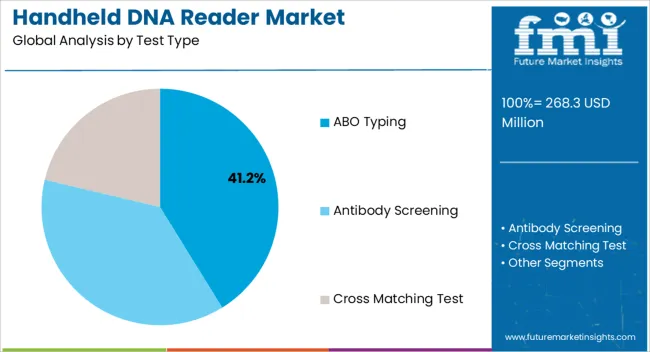
The ABO typing test type segment is projected to account for 41.2% of the Handheld DNA Reader market revenue in 2025, positioning it as the leading test type. This dominance is being driven by the critical role of ABO typing in clinical applications such as blood transfusions, organ transplants, and emergency medical procedures. The ability to quickly and accurately determine blood group compatibility at the point of care significantly improves patient outcomes and reduces risks associated with mismatched transfusions.
Handheld DNA readers designed for ABO typing enhance portability and accessibility, allowing healthcare providers to perform testing in diverse settings, from hospitals and blood banks to remote locations. These devices also reduce reliance on central laboratories, cutting down turnaround times and improving operational efficiency.
As demand for rapid and accurate blood group identification continues to grow, the ABO typing segment is benefiting from technological improvements in reagents and software integration The convenience, reliability, and clinical necessity of ABO typing are reinforcing its leadership, making it a key driver of adoption in the Handheld DNA Reader market.
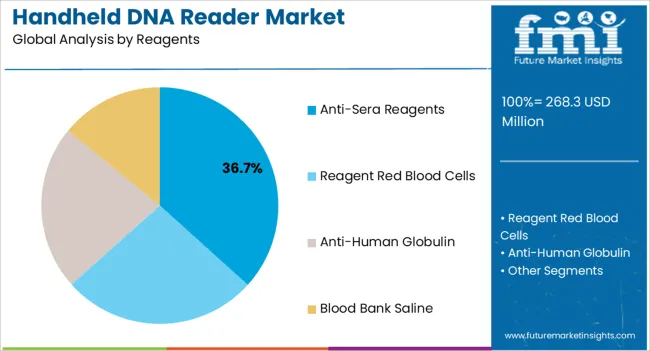
The anti-sera reagents segment is expected to hold 36.7% of the Handheld DNA Reader market revenue in 2025, establishing itself as the dominant reagent category. Growth in this segment is being fueled by the essential role of anti-sera reagents in detecting and confirming specific blood group antigens during ABO typing and related tests. These reagents are critical for achieving accurate results and ensuring the reliability of handheld DNA reader devices.
Their ability to deliver high sensitivity and specificity under varying conditions makes them indispensable for clinical and field-based applications. Manufacturers are focusing on developing advanced reagent formulations that extend shelf life, improve stability, and provide consistent performance, which enhances the efficiency of handheld readers.
The widespread adoption of anti-sera reagents in both developed and emerging healthcare systems reflects their importance in routine diagnostics and emergency medical scenarios As demand for portable, reliable, and cost-effective DNA testing solutions increases, anti-sera reagents are expected to maintain their prominence, serving as a foundational component in the ongoing expansion of the Handheld DNA Reader market.
Conventional DNA sequencing techniques are time consuming and costly. Therefore, instant molecular diagnosis of various disease types is essential in order to deliver high end medical services. Handheld DNA device is a portable, low weight genetic analyzer that analyses the target DNA sequence and uses an array of disposable on-chip cartridges, silicon biosensors, and micro fluids to find genetic mutations.
The device utilizes revolutionary polymerase chain reaction (PCR) technology, to make multiple copies of DNA. The technology then uses ion sensitive transistor to measure the production of DNA copies. The device allows rapid and early diagnosis of various diseases conditions such as cancer, malaria, human immunodeficiency virus (HIV), Ebola, gonorrhea, and tuberculosis (TB) in a very short duration.
The device is also used in sequencing small genomes, such as those of bacteria and viruses. The USB powered DNA reader comprises of thousands of wells each consisting of nanopores, resulting in formation of unique electronic signature which is detected using the analyzer providing a readout of the DNA sequence.
Nanpores are narrow protein channels that allow DNA strand to pass through. The use of nanopore technology virtually eliminates the need of overlap analysis and allows the DNA sequencing by sharply cutting the time using very strands of DNA. Beyond the health specific applications the device also helps protects endangered animal species from various diseases and from the risk of illegal trafficking and run checks on food.
Additionally the device also promises its potential applications to detect the DNA sequence of microorganisms in the space which would help in the genetic identification of microorganisms, analyzes changes in microorganisms and humans in response to spaceflight, which would possibly help scientist uncover DNA-based life other than planet earth.
The global market for handheld DNA readers market is expected to witness a higher demand in the near future as a result of its potential to deliver improved treatment outcomes and possibility to prevent epidemics.
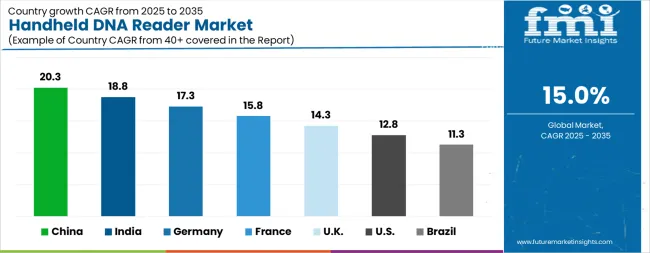
| Country | CAGR |
|---|---|
| China | 20.3% |
| India | 18.8% |
| Germany | 17.3% |
| France | 15.8% |
| UK.= | 14.3% |
| USA | 12.8% |
| Brazil | 11.3% |
The Handheld DNA Reader Market is expected to register a CAGR of 15.0% during the forecast period, exhibiting varied country level momentum. China leads with the highest CAGR of 20.3%, followed by India at 18.8%. Developed markets such as Germany, France, and the UK continue to expand steadily, while the USA is likely to grow at consistent rates. Brazil posts the lowest CAGR at 11.3%, yet still underscores a broadly positive trajectory for the global Handheld DNA Reader Market. In 2024, Germany held a dominant revenue in the Western Europe market and is expected to grow with a CAGR of 17.3%. The USA Handheld DNA Reader Market is estimated to be valued at USD 100.3 million in 2025 and is anticipated to reach a valuation of USD 333.1 million by 2035. Sales are projected to rise at a CAGR of 12.8% over the forecast period between 2025 and 2035. While Japan and South Korea markets are estimated to be valued at USD 14.0 million and USD 6.8 million respectively in 2025.
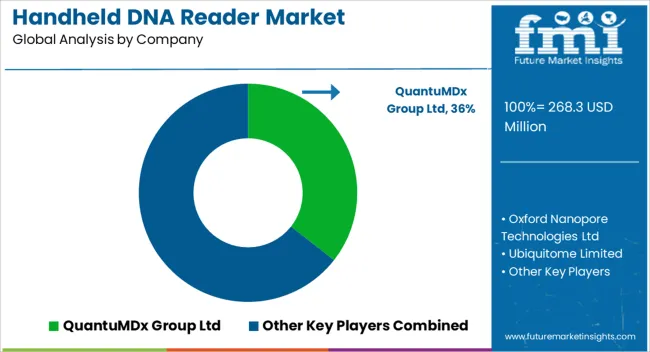
| Item | Value |
|---|---|
| Quantitative Units | USD 268.3 Million |
| Test Type | ABO Typing, Antibody Screening, and Cross Matching Test |
| Reagents | Anti-Sera Reagents, Reagent Red Blood Cells, Anti-Human Globulin, and Blood Bank Saline |
| Regions Covered | North America, Europe, Asia-Pacific, Latin America, Middle East & Africa |
| Country Covered | United States, Canada, Germany, France, United Kingdom, China, Japan, India, Brazil, South Africa |
| Key Companies Profiled | QuantuMDx Group Ltd, Oxford Nanopore Technologies Ltd, Ubiquitome Limited, and Cepheid Inc. |
The global handheld DNA reader market is estimated to be valued at USD 268.3 million in 2025.
The market size for the handheld DNA reader market is projected to reach USD 1,085.5 million by 2035.
The handheld DNA reader market is expected to grow at a 15.0% CAGR between 2025 and 2035.
The key product types in handheld DNA reader market are abo typing, antibody screening and cross matching test.
In terms of reagents, anti-sera reagents segment to command 36.7% share in the handheld DNA reader market in 2025.






Our Research Products

The "Full Research Suite" delivers actionable market intel, deep dives on markets or technologies, so clients act faster, cut risk, and unlock growth.

The Leaderboard benchmarks and ranks top vendors, classifying them as Established Leaders, Leading Challengers, or Disruptors & Challengers.

Locates where complements amplify value and substitutes erode it, forecasting net impact by horizon

We deliver granular, decision-grade intel: market sizing, 5-year forecasts, pricing, adoption, usage, revenue, and operational KPIs—plus competitor tracking, regulation, and value chains—across 60 countries broadly.

Spot the shifts before they hit your P&L. We track inflection points, adoption curves, pricing moves, and ecosystem plays to show where demand is heading, why it is changing, and what to do next across high-growth markets and disruptive tech

Real-time reads of user behavior. We track shifting priorities, perceptions of today’s and next-gen services, and provider experience, then pace how fast tech moves from trial to adoption, blending buyer, consumer, and channel inputs with social signals (#WhySwitch, #UX).

Partner with our analyst team to build a custom report designed around your business priorities. From analysing market trends to assessing competitors or crafting bespoke datasets, we tailor insights to your needs.
Supplier Intelligence
Discovery & Profiling
Capacity & Footprint
Performance & Risk
Compliance & Governance
Commercial Readiness
Who Supplies Whom
Scorecards & Shortlists
Playbooks & Docs
Category Intelligence
Definition & Scope
Demand & Use Cases
Cost Drivers
Market Structure
Supply Chain Map
Trade & Policy
Operating Norms
Deliverables
Buyer Intelligence
Account Basics
Spend & Scope
Procurement Model
Vendor Requirements
Terms & Policies
Entry Strategy
Pain Points & Triggers
Outputs
Pricing Analysis
Benchmarks
Trends
Should-Cost
Indexation
Landed Cost
Commercial Terms
Deliverables
Brand Analysis
Positioning & Value Prop
Share & Presence
Customer Evidence
Go-to-Market
Digital & Reputation
Compliance & Trust
KPIs & Gaps
Outputs
Full Research Suite comprises of:
Market outlook & trends analysis
Interviews & case studies
Strategic recommendations
Vendor profiles & capabilities analysis
5-year forecasts
8 regions and 60+ country-level data splits
Market segment data splits
12 months of continuous data updates
DELIVERED AS:
PDF EXCEL ONLINE
DNA Diagnostics Market Size and Share Forecast Outlook 2025 to 2035
Handheld Electrostatic Meter Market Size and Share Forecast Outlook 2025 to 2035
DNA Microarray Market Forecast Outlook 2025 to 2035
Handheld Ultrasound Scanner Market Size and Share Forecast Outlook 2025 to 2035
Handheld Tagging Gun Market Forecast and Outlook 2025 to 2035
Handheld Imaging Systems Market Size and Share Forecast Outlook 2025 to 2035
Handheld XRF Analyzers Market Size and Share Forecast Outlook 2025 to 2035
Handheld Police Radar Guns Market Size and Share Forecast Outlook 2025 to 2035
DNA Methylation Conversion Kit Market Size and Share Forecast Outlook 2025 to 2035
Handheld Robotic Navigation Market Analysis - Size, Share, and Forecast Outlook 2025 to 2035
Handheld Mesh Nebulizer Market Size and Share Forecast Outlook 2025 to 2035
DNA-Modified Plant Extracts Market Analysis - Size and Share Forecast Outlook 2025 to 2035
DNA-Repair Enzymes Market Analysis - Size, Share, and Forecast Outlook 2025 to 2035
DNA Chromatography Chips Market Size and Share Forecast Outlook 2025 to 2035
Handheld Chemical and Metal Detector Market Size and Share Forecast Outlook 2025 to 2035
Handheld Dental X-Ray Systems Market Analysis - Size, Share, and Forecast 2025 to 2035
DNA Methylation Market Size and Share Forecast Outlook 2025 to 2035
DNA Polymerase Market Analysis - Size, Share, and Forecast 2025 to 2035
Handheld Concrete Saws Market Size and Share Forecast Outlook 2025 to 2035
DNA Sequencing Services Market Trends - Growth & Forecast 2025 to 2035

Thank you!
You will receive an email from our Business Development Manager. Please be sure to check your SPAM/JUNK folder too.
Chat With
MaRIA